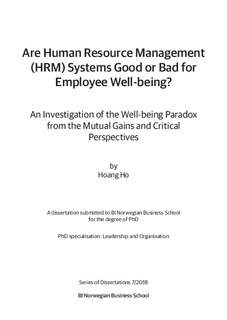Are Human Resource Management (HRM) Systems Good or Bad for Employee Well-being? An Investigation of the Well-being Paradox from the Mutual Gains and Critical Perspectives
Doctoral thesis
Permanent lenke
http://hdl.handle.net/11250/2501948Utgivelsesdato
2018Metadata
Vis full innførselSamlinger
Sammendrag
This PhD consists of three individual studies, addressing two of the most controversial debates in the human resource management (HRM) literature today: the “good vs. bad” debate (whether HRM practices are good or bad for employee well-being), and the “fit-misfit” debate (whether a good fit will be associated with superior performance). Regarding the first debate, some have argued that HRM systems are good both for employees and employers, (the mutual gains perspective), but others said bad for employees (the critical perspective). To enlighten this issue, a meta-analysis of 72 studies, covering 89,027 employees was conducted, showing that HRM systems were associated with positive well-being but not with negative well-being and that positive well-being mediated the relationship between HRM systems and overall performance. In addition, positive well-being was associated with increased overall performance and negative well-being with decreased overall performance. Regarding the second debate, despite the compelling theoretical argument that better internal and external fit will increase firm performance, empirical evidence of internal/external fit, to date, is fragmented and disappointing. To shed light on this issue, a meta-analysis of 97 studies, covering 23,796 firms was conducted, showing that firms with a high level of internally consistent commitment-based HRM systems outperform those with a low level of internally consistent HRM systems.
